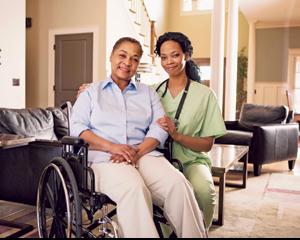When Lezlie Lee Kam fell down the stairs at her home in 2006, she ended up in a two-month coma. She then faced many more months of rehab to learn how to walk again.
She also had to learn how to come out again.
Faced with deciding whether she should disclose her sexuality to her home-care giver, Lee Kam, now 59, was confronted with emotions she hadn’t felt for decades. Unsure whether personal-support workers undergo sensitivity training, she decided to withhold her sexuality for nearly seven months.
But recently, after changes to home-care-provider boundaries that found Lee Kam’s dedicated caregiver removed from her neighbourhood, she was faced with another decision — whether to start the process of coming out to a new caregiver or find another way. She opted to provide her own support system out-of-pocket rather than deal with the uncertainty of untrained caregivers.
Lee Kam is part of a York University research study that hopes to illuminate the experiences of queer home-care users. The fear of “self-disclosing,” or coming out, is expected to be a major concern, despite the fact that many home-care users have lived openly gay lives for decades. Home care takes them back to the start.
“It’s like coming out all over again, except you’re doing it when you’re naked,” Lee Kam says.
Unlike the experience of coming out to friends and family, self-disclosing to a support worker puts the home-care user in a uniquely vulnerable position. This kind of continued intimate contact within the healthcare system makes the experience of queer people important to study, says York researcher Andrea Daley. It’s not simply the discrimination, something all members of the queer community may face, that is the issue, she says.
“It becomes a bit of a different story when you’re faced with a healthcare system and you’re trying to access services for yourself or a partner,” she says. “It’s this layered thing where you’re trying to manage your health or your partner’s health or a friend’s health and at the same time trying to address barriers to care as a result of homophobia and heterosexism.”
While some previous studies have revealed experiences of lesbians being denied care and treated roughly upon coming out, most of the research is on hospital-based services, Daley says. There is little available research on the experiences of the queer community with home care.
The Ontario-wide project, initiated in 2008, is a joint effort that stretches across the province to advisory committees and other universities, including McGill, McMaster and even California State. Daley is co-leading the project with fellow York professor Judith MacDonnell from the School of Nursing. The team hopes to work with healthcare groups and not demonize them.
“We really want to approach this in a way that is constructive and productive for agencies as opposed to finger-pointing,” Daley says.
During preliminary research, Daley spoke with focus groups of personal-support workers and found that they are eager to learn about the unique challenges of the queer community.
“They very clearly said to us that most of their training is related to the technical aspects of their job,” Daley says. “They very rarely have access to training related to working with particular communities and populations and how to work sensitively with those communities.”
The first phase of the project involves an online survey through which they hope to hear from 100 different home-care users. In the first month after the survey was implemented, they received about 40 completed surveys.
In a preliminary scan of the responses Daley has received so far, many are reporting positive experiences with home care, as well as negative ones.
Lee Kam, too, says the caregiver she came out to after nearly seven months was accepting. But she was never comfortable with the nine other caregivers she rotated through. To restart the process with each caregiver was discouraging.
“We deal with all the phobia and the fear and the hate outside of our front doors,” she says. “So to have to deal with it inside of our homes silences us.”
With this new research study, Lee Kam and Daley hope to break that silence.
Find out more about the Home Care Access Project at yorku.ca/lgbthome.

 Why you can trust Xtra
Why you can trust Xtra


